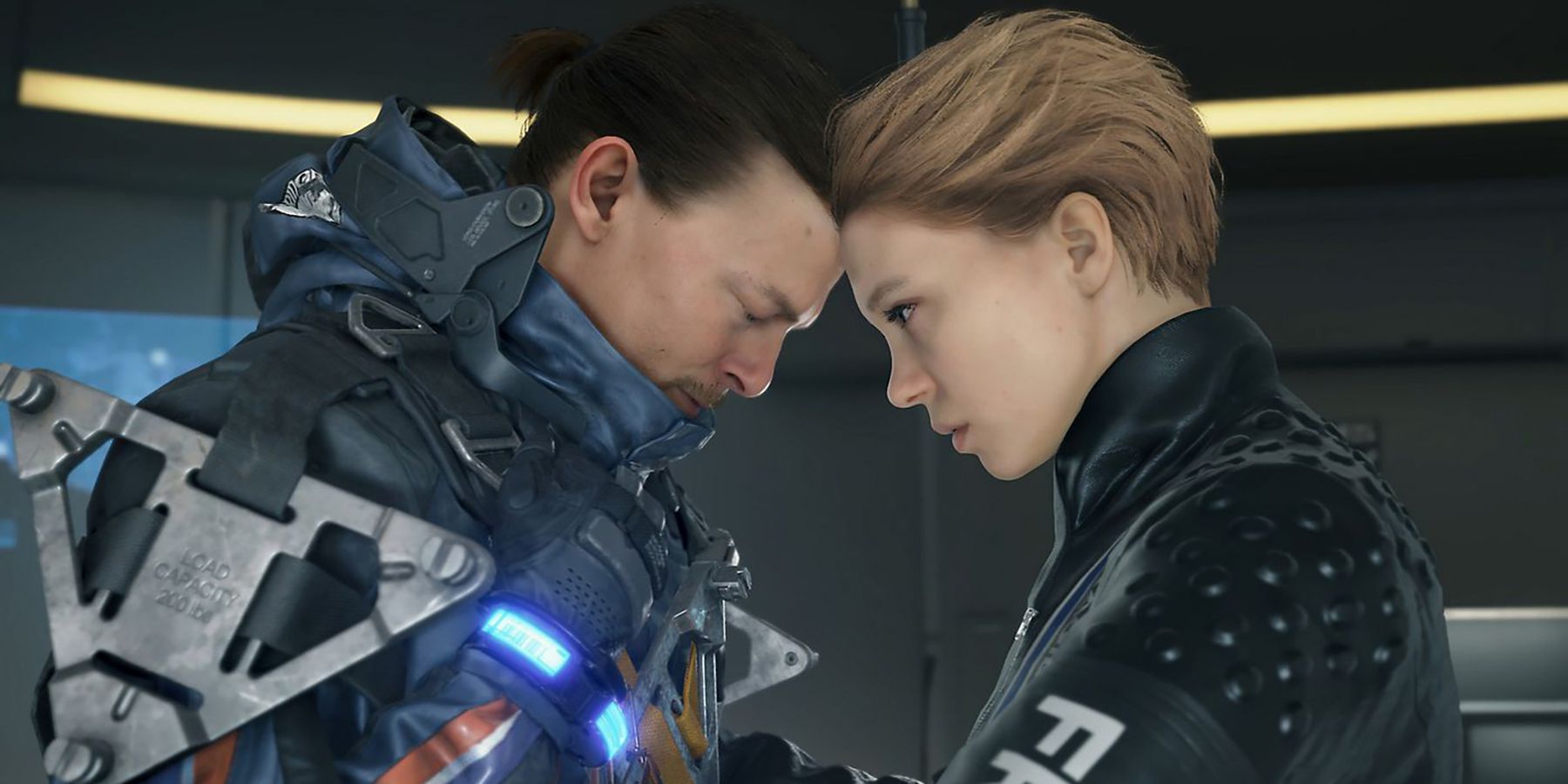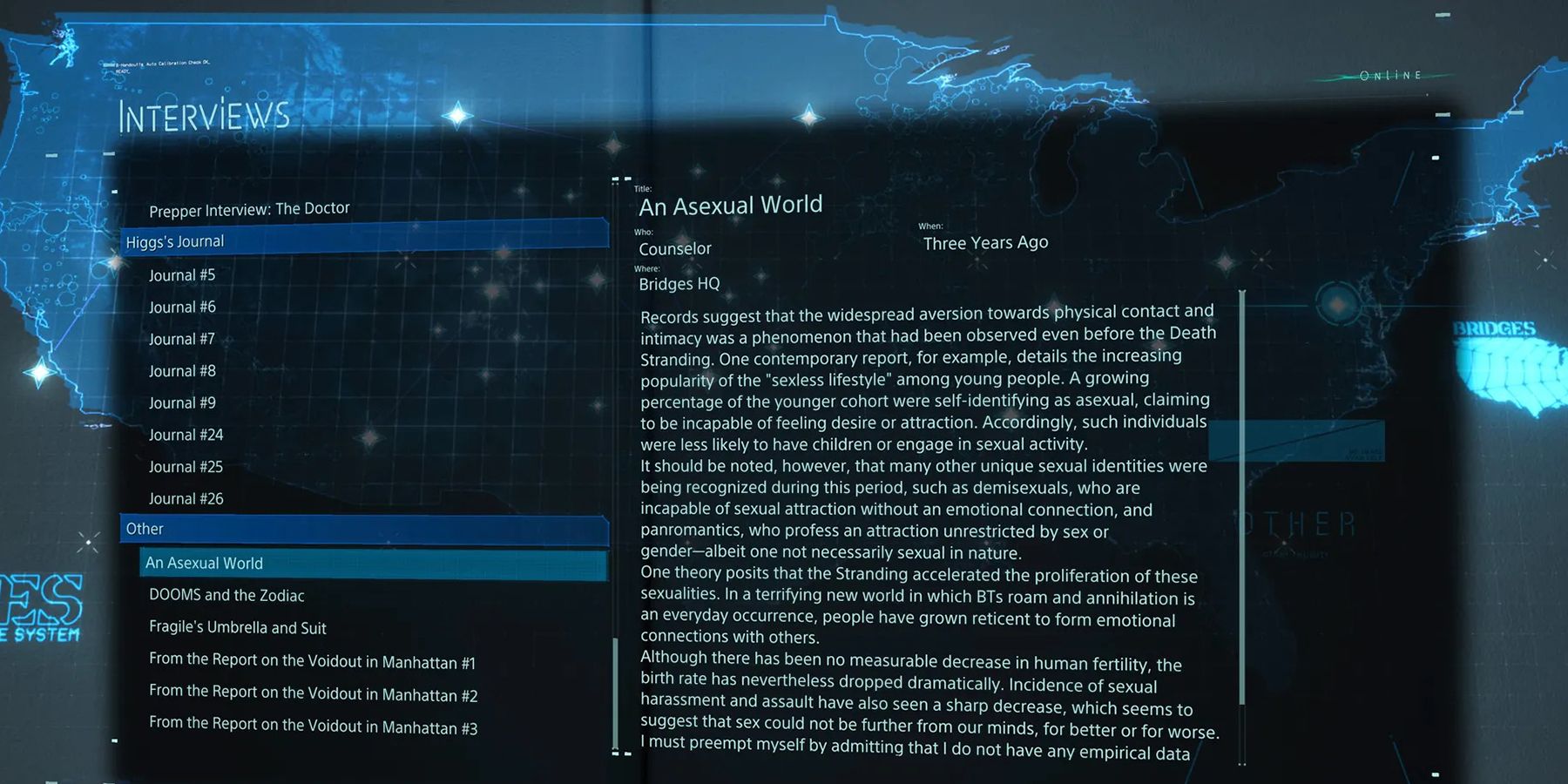Death Stranding Director's Cut, in typical Hideo Kojima fashion, tells an eccentric yet enthralling story of a world plagued by social alienation following a dystopian catastrophe. The Director's Cut version improves visuals, implements DualSense controller features, and adds additional weapons and missions to the game. For Death Stranding veterans, the director's cut gives them new reasons to jump back into one of Kojima's most impressive works, while it offers the game at its most polished and refined for newcomers.
An often overlooked change in Death Stranding Director's Cut is a small yet impactful edit to one of the game's data logs. The change, while easy to miss, corrects a disappointing error contained in the original game. However, it does so in a way that acknowledges past missteps and highlights why the correction is necessary. The controversy focuses on asexuality, a topic that often receives a lack of attention, and it would have been easy for Death Stranding to ignore the issue. By addressing some of the concerns artfully in Death Stranding Director's Cut, the game offers a praiseworthy example of how video games can respond to their own mistakes.
Death Stranding's Mischaracterization of Asexuality
In Death Stranding, players are introduced to Sam Bridges, who is tasked with making important deliveries that will reunite a fractured, post-apocalyptic America once more. Sam's job is a difficult one because he has to heal a divided nation that has learned to fear closeness and bonds with others. People live in bunkers, and they feel much safer if they can hole themselves up alone and distance themselves from others. Sam, who has a fear of being touched, must also learn to overcome his own fears and forge connections with those around him.
A prevalent theme in the game is social isolation and its effects, and how this undesirable condition can be cured by learning to connect with people, a theme fully integrated into Death Stranding's gameplay. Although the landscapes players are forced to trek through are hauntingly lonely, players are reminded that they are not truly alone through the helpful structures they come across, built by other players. Players can also choose to help other gamers by leaving behind climbing ropes, ladders, and other structures in useful spots.
As Sam makes his deliveries, there are interviews and data logs that players can unlock that give more information about the world he inhabits. While most of these will likely be passed over by casual or uninterested gamers, there is one that managed to spark a bit of controversy.
The data log in question is titled "An Asexual World." The log claims that before the in-game Death Stranding event that fractures society, there was a growing number of young people that self-identified as asexual. According to the log, such people are "incapable of feeling desire or attraction," and they are "less likely to have children or engage in sexual activity." The log also adds that there is a theory that the Death Stranding event accelerated the proliferation of asexuality and similar sexualities.
This data log was considered offensive by some, especially those in the asexual community. It describes asexuality as a "sexless lifestyle," reducing a core sexual identity to a mere lifestyle choice. Furthermore, it reinforces pre-existing notions that asexual individuals are incapable of feeling desire or attraction. While asexuals, to varying degrees, may lack sexual attraction, they are very capable of feeling other forms of desire, attraction, and intimacy.
Most disappointingly, it links asexuality with the Death Stranding, which is a decidedly dystopian event. In doing so, asexuality is pathologized and represented as something that is a deviation from the norm. In this case, it is a deviation linked to a terrible mass extinction event. Such portrayals can be psychologically harmful to asexual individuals who may already feel alienated in a sexualized world.
Death Stranding Director's Cut Presents a Better Asexual World
In Death Stranding Director's Cut, many gamers may find themselves attracted to the race courses or the firing range added to the game. Others may find the new indoor missions appealing, seemingly taking inspiration from the Metal Gear-era of Kojima's career, featuring prominent stealth elements. For some, the new music is the main draw, as the game offers some of the most ambiently blissful songs to relax to after a grueling hike.
The "An Asexual World" data log makes a reappearance in Death Stranding Director's Cut, but there is a notable difference. Below the original log, there is a note with the heading "FLAGGED FOR ARCHIVAL REVIEW." The note explains that the previous log advances ideas that are discriminatory and unsubstantiated.
Instead of blaming the Death Stranding event for the increase in individuals identifying as asexual, the note argues that in the past, individuals with marginalized identities suppressed and concealed themselves as a survival strategy. Hence, the increase in self-identified asexuals can be attributed to growing societal awareness and acceptance. The note also acknowledges that identities that fall outside of heterosexual and cisgender norms face discrimination and persecution.
This change, although slight, is incredibly impactful and represents a redemption arc for the story of Death Stranding's portrayal of asexuality. It acknowledges the past data log and does not attempt to bury it. Instead, it carefully explains the issues with the data log and why it can be considered discriminatory. It decouples the connection between asexuality and the Death Stranding, and in doing so asexuality is no longer presented as a pathological condition, but rather as a normal identity.
Through this change, Death Stranding has transformed itself from a piece of media containing a harmful representation of asexuality to one that serves as a teaching tool that facilitates a greater understanding of the identity. Rather than resort to insincere public apologies or simple deletion of the data log, Death Stranding instead learned from its mistakes and rectified them in a way that shows respect for the asexual community. However, this addendum is done in a way that does not break immersion from Death Stranding's narrative.
Death Stranding Director's Cut's handling of asexuality illustrates a good template for how video games can deal with social issues, and how they can acknowledge their own mistakes when they misspeak on these issues. Such moments need not be occasions for cover-ups and defensiveness. Instead, developers can engage the concerns of their player-base, genuinely understand their viewpoints, and have the courage to correct themselves when necessary.
Death Stranding Director's Cut is available on PS5.



.jpg)